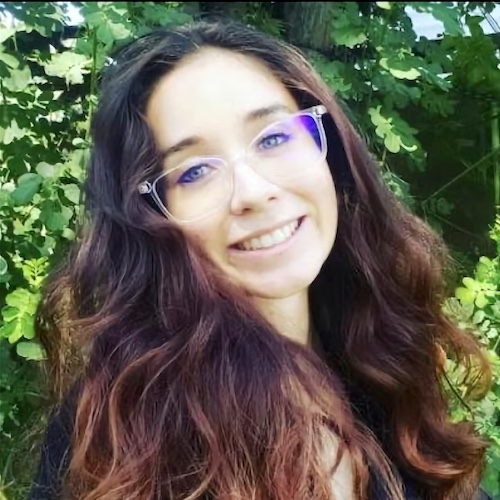Valerie Angel Tapia(she/her/hers)
My broad research interests are focused on healthcare equity, social justice, and intervention design and implementation. I aim to understand occupational needs and barriers that are critical to providing well-informed and client-centered interventions. I believe that optimized outcomes for patients will stem from a team based care approach, which requires systematic shifts that can benefit both the provider and ultimately the patient. In Lifestyle Redesign for Chronic Conditions Lab my role is to enhance Lifestyle Redesign application at LACUSC, using practice-based research to continuously evaluate and enhance the impact occupational therapists have on patients with chronic conditions in primary care.
Education
Bachelor of Arts (BA)
in Psychology
2021 | California State Polytechnic University
Selected Publications
Pyatak, E. A., Ali, A., Khurana, A. R., Lee, P.-J., Sideris, J., Fox, S., Díaz, J., Granados, G., Blanchard, J., McGuire, R., Salazar Plascencia, E., Salcedo-Rodriguez, E., Flores-Garcia, J., Linderman, M., Taylor, E. E., Tapia, V., Nnoli, N., Sequeira, P. A., Freeby, M. J., & Raymond, J. K. (2023). Research design and baseline participant characteristics of the Resilient, Empowered, Active Living with Diabetes - Telehealth (REAL-T) Study: A randomized controlled trial for young adults with type. Contemporary Clinical Trials, 135, 107386. https://doi.org/10.1016/j.cct.2023.107386 Show abstract
Background. Type 1 diabetes (T1D) is a chronic condition affecting nearly 1.9 million people in the United States. Young adults (YAs) with T1D face unique challenges in managing their condition, experiencing poorer health and well-being than other age groups. The current study is evaluating the Resilient, Empowered, Active Living (REAL) intervention, previously shown to improve glucose levels and quality of life among YAs with diabetes, using telehealth delivery (REAL-T) to expand reach and accessibility. This paper reports on the methodology and baseline participant characteristics of the REAL-T study.
Methods. REAL-T is a two-arm randomized controlled trial that recruited 18–30 year olds with T1D via clinics and social media advertising. Data collection, which was adapted to be fully remote due to COVID-19, occurs every three months for one year. Participants receive either usual care or a 6-month telehealth occupational therapy intervention. The primary outcome is glycated hemoglobin (A1c); secondary outcomes include diabetes distress, quality of life, and continuous glucose monitor-derived measures.
Results. The study enrolled a diverse sample of 209 YAs with T1D. Analysis of baseline data indicates equivalence between the intervention and control groups. Study participants have notably higher diabetes distress and poorer mental well-being than similar populations.
Conclusion. The REAL-T study successfully adapted to remote implementation during the COVID-19 pandemic. By examining long-term outcomes, mediating pathways, and cost-effectiveness, the study will contribute knowledge of the impact of tailored interventions for YAs with T1D, designed to reduce disparities and improve health and well-being in this population.
Tapia, V. A., Gregorio, A. M., & Thorne, B. (2021). How mindfulness meditation impacts long-term explicit semantic memory. Bronco Scholar. Full text Show abstract
In light of the Coronavirus-19 Pandemic inflicting the world, college students in the United State of America are concerned about their health, the state of the economy, and dramatic lifestyle shifts, and they are experiencing an increased level of stress (Copeland et al., 2020). Stress takes a toll on our cognitive function, which can negatively impact our abilities to store information. Studies have shown that both music and the practice of mindfulness meditation strengthens brain function, which helps to enhance memory (Ferreri et al., 2013; Roozendaal et al., 2009). The current experimental study aimed to provide insight to pinpoint the benefits of how a single meditation along with music could improve memory recall, and their ability to aid one’s cognitive abilities to remember words that are attempted to be stored in memory semantically. Participants were majority female 84.7%, Hispanic or LaxinX 42.4%, between the ages of 18 and 25 83.9%, and at or below poverty level 61.1%. It was expected that participants who listened to background music during encoding and recall as well as engaged in a mindfulness meditation would remember the most words. There were no significant differences in memory recall when participants practiced mindfulness meditations or listened to music F(3)=1.47, P>.05. Additional data collection, or a larger and more generalizable sample, would be necessary to increase the power of this study. This should not discount the individual benefits that both mindfulness meditations and music have independently shown in the past.
Keywords. mindfulness, meditation, memory, recall, music, semantic memory, relaxation, body relaxation, body scans, mindfulness meditation
Awards
Chancellor's Doctoral Incentive Program Fellowship | 2021
California State University
Joint Fellowship | 2021
USC Chan Division of Occupational Science and Occupational Therapy
Lowell Overton Community Service Award | 2021
College of Letters, Arts, and Social Sciences, California State Polytechnic University, Pomona
Research Distinction Award | 2021
California State Polytechnic University, Pomona
Ronald E. McNair Scholars Stipend | 2021
California State Polytechnic University, Pomona
RSCA Michi and Walter Weglyn Conference Presentation Award | 2021
California State Polytechnic University, Pomona
Diversity, Inclusion, Access Jumpstart Stipend | 2020
University of Southern California
Access disABILITY and Alliance Scholarship | 2020
Disability Resource Center, California State Polytechnic University, Pomona
Balanced Leader Scholarship | 2020
Sigma Phi Epsilon Chapter, California State University Polytechnic, Pomona
Office of Undergraduate Research Conference Award | 2020
California State Polytechnic University, Pomona
CPP Middle Class Scholarship | 2019
California State Polytechnic University, Pomona
⋯






